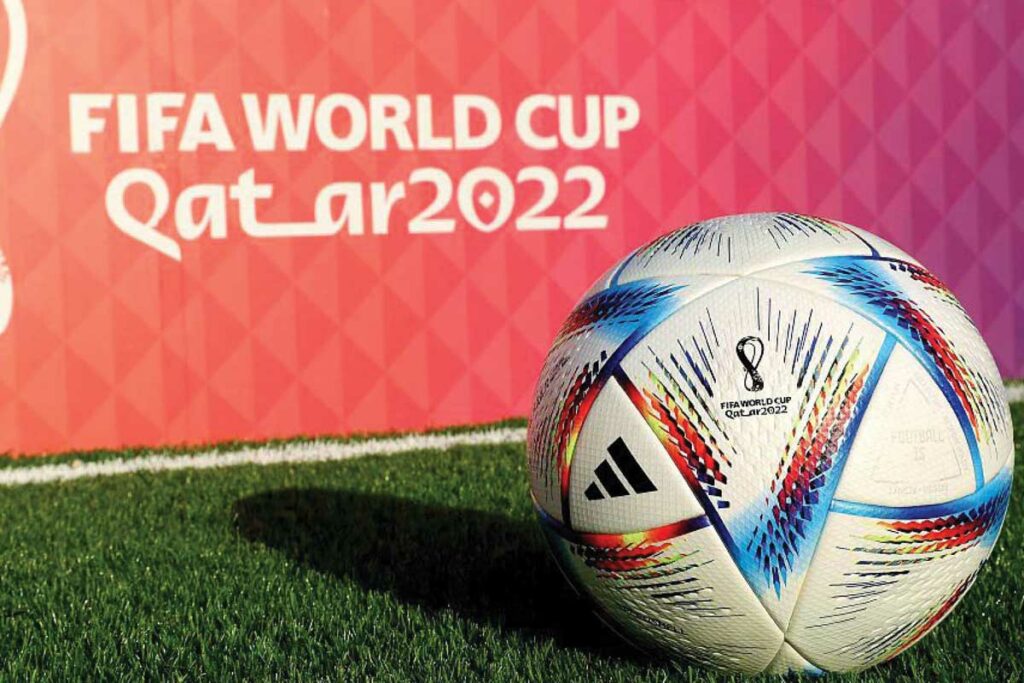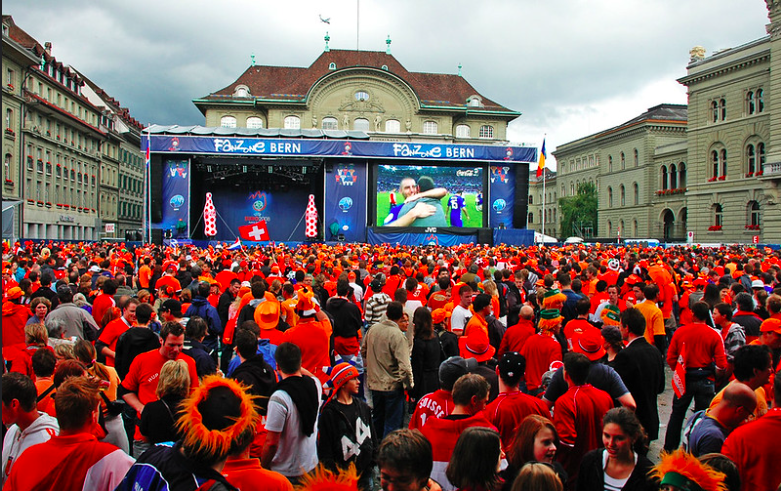Thu, Nov 24th 2022
Qatar is the first Arab nation ever to host the FIFA World Cup since its inception in 1930; but controversy has clouded the event since the start. Some Swiss cities are so against the host country that they have banned public viewings of World Cup matches – quite the protest considering FIFA’s headquarters are Swiss.

Switzerland’s manager Murat Yakin said on Wednesday the current national team is the “best that ever existed” including team captain Granit Xhaka (center) and powerhouse Noah Okafor (left) (Credit: FIFA).
When FIFA’s then-president, Sepp Blatter, announced that “the winner to organize the 2022 FIFA World Cup is Qatar,” football fans around the world were understandably surprised. Qatar is a tiny desert nation with great wealth and conservative values, but it’s not been known for a long history with football. With sweltering temperatures, Sharia law forbidding public alcohol consumption, and less than 12,000 square kilometers of space, a World Cup in Qatar seemed likely to be riddled with obstacles.
Controversy from the start
Even Qatar acknowledged that hosting the biggest sporting event on the globe would be a logistical challenge. Early in the process, Qatar’s bid chief executive, Hassan Al-Thawadi, told FIFA’s council, “We know it would be a bold gamble and an exciting prospect but with no risk. Heat is not and will not be an issue.”
Campaigning in 2010 against sporting powerhouses like Japan and the US, Qatar’s hopes of hosting the tournament seemed slim. But in a landmark decision, the twenty-two-member FIFA Council voted to award 2022 the hosting rights to Qatar, a country that has never qualified to play in the World Cup. Along with winning the honor of hosting the tournament, Qatar was also automatically granted the right to compete in the World Cup.

Hosting a World Cup is a far bigger win for a country than having their football team win the World Cup trophy.
Accusations of bribery and racketeering
FIFA’s justification for awarding Qatar the hosting rights included taking the tournament to a new part of the world and supporting the region’s growing interest in the game. As a Swiss non-profit organization, developing football worldwide is one of FIFA’s stated legal purposes. But fans were more than a little skeptical of FIFA’s motives, and rightly so. (Read more: FIFA, Switzerland and their inextricable link).
Just two months before FIFA announced the hosts of 2018 and 2022, two members of FIFA’s Council were suspended on suspicion of selling votes. Further investigations into FIFA by the US Justice Department and Swiss authorities uncovered a tangled web of scandals dating back to the 1990s. The charges included racketeering, wire fraud, and money laundering.
The investigation included a Qatari soccer official and former FIFA Council member allegedly bribing FIFA officials up to $3.7 billion for the rights to host the World Cup. For countries like Qatar, a tiny nation with powerful neighbors, the World Cup is much more than bragging rights. It’s an opportunity to flex soft power, develop national branding, and support economic strategy.
Qatar has reportedly splashed out a staggering $229 billion to build the required infrastructure for such a large event. And it’s unlikely that the nation will recoup these costs as most of the profits made at the World Cup go directly to FIFA.
Despite evidence of serious irregularities in the bidding process, investigators found no conclusive proof that Qatari officials had used bribes to influence the vote outcome. Qatar has also firmly denied any wrongdoing.
“We are 100% confident in the integrity of our bid,” a spokesperson for Qatar’s Supreme Committee for Delivery & Legacy said in a statement.

The FIFA World Cup 2022 games are being played in eight stadiums in Qatar. The Al Janoub stadium was designed by famous Iraqui-British architect Zaha Hadid.
Football in the desert
But Qatar has money to spend. Thanks to the world’s third-largest natural gas reserve, Qatar ranks as one of the wealthiest nations in the world, boasting the highest GDP per capita. The current energy crisis has further boosted Qatar’s economy.
“If wealth is power, then the Qataris have some serious muscle to flex,” wrote Forbes contributor Beth Greenfield shortly after Qatar was chosen. As a nation whose economy is entirely dependent on oil and gas, Qatar has known for a long time that it would need to diversify. Spectator sports has been an essential part of this plan.
“Qatar has bolstered its international profile thanks to its use of soft power; it has to do this because it’s a tiny country in a neighborhood of big countries – and sport is a very significant way of doing this,” Karim Sader, a political consultant specializing in Gulf states, explained to France24.

Despite 12 years of persistent rumors, Qatar has not been linked to any hard evidence of bribery (Credit: FIFA).
The cup kicks off amidst looming controversy
The gulf nation has continued to face fierce criticism surrounding the country’s questionable human rights standards. To build the World Cup facilities, Qatar has relied on thousands of migrant workers from countries like Nepal and India. According to an analysis by The Guardian, at least 6,750 construction workers have died in Qatar since the World Cup was awarded in 2010. Deaths have been due to extreme conditions, including squalid housing, searing heat, and rotten food.
Treatment of women and LBQTQ+ people
Further concerns surround Qatar’s conservative law and treatment of women and LGBTQ+ people. A Qatari World Cup ambassador told the German television broadcast ZDF that homosexuality was “damage in the mind.” Under Sharia, same-sex relationships and homosexual displays are illegal.
In a 2021 report, Human Rights Watch documented that Qatari laws deny women the right to make key life decisions. Discriminatory restrictions impact women’s choices regarding personal health, marriage, travel, and study.
Despite this, Qatar has repeatedly stated that all visitors to Qatar will be welcome “regardless of origin, background, religion, gender, sexual orientation or nationality.”

Many Swiss cities have banned large, public viewings of World Cup matches in protest of Qatar as the host country. Pictured above is one such “Fan Zone” in Bern in 2008.
The Swiss response
As Switzerland prepares to play Cameroon today, the Swiss response to the tournament has ranged from lukewarm to outraged.
Swiss cities have banned any demonstration or broadcast in a public space connected to the World Cup. Zürich, FIFA’s home, Vevey, and Geneva have all banned fan zones and viewings of the World Cup on public land.
Mischa Schiwow, council president of AL Zurich, said the ban is a protest against the World Cup host country. So far, few Swiss football fans have spoken up against the ban as it is still available at most bars and restaurants.
Switzerland was also one of ten European nations that planned to wear a OneLove armband as a message of inclusion until FIFA threatened to punish players and teams with sanctions for wearing the armband.
What remains to be seen is whether a significant portion of Swiss citizens will join in boycotting the World Cup.
This article may be freely shared and re-printed, provided that it prominently links back to the original article.
